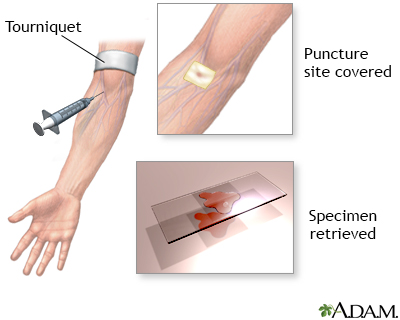Tests and visits before surgery
Your surgeon will want to make sure you are ready for your surgery. To do this, you will have some checkups and tests before surgery.
Many different people on your surgery team may ask you the same questions before your surgery. This is because your team needs to gather as much information as they can to give you the best surgery results. Try to be patient if you are asked the same questions more than once.
Pre-op Checkup
Pre-op is the time before your surgery. It means "before operation." During this time, you will meet with one of your health care providers. This may be your surgeon or primary care provider:
- This checkup usually needs to be done within the month before surgery. This gives your providers time to treat any medical problems you may have before your surgery.
- During this visit, you will be asked about your health over the years. This is called "taking your medical history." Your provider will also do a physical exam.
- If you see your primary care provider for your pre-op checkup, make sure your hospital or surgeon gets the reports from this visit.
Some hospitals also ask you to have a phone conversation or meet with an anesthesia pre-op nurse before surgery to discuss your health.
You may also see your anesthesia provider the week before surgery. This provider will give you medicine that will make you sleep and not feel pain during surgery.
Visits With Other Doctors
Your surgeon will want to make sure that other health conditions you may have will not cause problems during your surgery. So you may need to visit:
- A heart doctor (cardiologist), if you have a history of heart problems or if you smoke heavily, have high blood pressure or diabetes, or are out of shape and cannot walk up a flight of stairs.
- A diabetes doctor (endocrinologist), if you have diabetes or if your blood sugar test in your pre-op visit was high.
Diabetes
Diabetes is a long-term (chronic) disease in which the body cannot regulate the amount of sugar in the blood.
 ImageRead Article Now Book Mark Article
ImageRead Article Now Book Mark ArticleBlood sugar test
A blood sugar test measures the amount of sugar (glucose) in a sample of your blood. Glucose is a major source of energy for most cells of the body, ...
 ImageRead Article Now Book Mark Article
ImageRead Article Now Book Mark Article - A sleep doctor, if you have obstructive sleep apnea, which causes choking or a stop in breathing when you are asleep.
Obstructive sleep apnea
Obstructive sleep apnea (OSA) is a problem in which your breathing pauses during sleep. This occurs because of narrowed or blocked airways.
 ImageRead Article Now Book Mark Article
ImageRead Article Now Book Mark Article - A doctor who treats blood disorders (hematologist), if you've had blood clots in the past or you have close relatives who have had blood clots.
- Your primary care provider for a review of your health problems, exam, and any tests needed before surgery.
Tests Before Surgery
Your surgeon may tell you that you need some tests before surgery. Some tests are for all surgical patients. Others are done only if you are at risk for certain health conditions.
Common tests that your surgeon may ask you to have if you have not had them recently are:
- Blood tests such as a complete blood count (CBC) and kidney, liver, and blood sugar tests
Complete blood count (CBC)
A complete blood count (CBC) test measures the following:The number of white blood cells (WBC count)The number of red blood cells (RBC count)The numb...
 ImageRead Article Now Book Mark Article
ImageRead Article Now Book Mark Article - Chest x-ray to check your lungs
Chest x-ray
A chest x-ray is an x-ray of the chest, lungs, heart, large arteries, ribs, and diaphragm.
 ImageRead Article Now Book Mark Article
ImageRead Article Now Book Mark Article - Electrocardiogram (ECG) to check your heart
Electrocardiogram
An electrocardiogram (ECG) is a test that records the electrical activity of the heart.
 ImageRead Article Now Book Mark Article
ImageRead Article Now Book Mark Article
Some providers or surgeons may also ask you to have other tests. This depends on:
- Your age and general health
- Health risks or problems you may have
- The type of surgery you are having
These other tests may include:
- Tests that look at the lining of your bowels or stomach, such as a colonoscopy or upper endoscopy
Colonoscopy
A colonoscopy is an exam that views the inside of the colon (large intestine) and rectum, using a tool called a colonoscope. The colonoscope has a sm...
 ImageRead Article Now Book Mark Article
ImageRead Article Now Book Mark ArticleUpper endoscopy
Esophagogastroduodenoscopy (EGD) is a test to examine the lining of the esophagus, stomach, and first part of the small intestine (the duodenum)....
 ImageRead Article Now Book Mark Article
ImageRead Article Now Book Mark Article - Heart stress test or other heart tests
Heart stress test
An exercise stress test is used to measure the effect of exercise on your heart.
 ImageRead Article Now Book Mark Article
ImageRead Article Now Book Mark Article - Lung function tests
Lung function tests
Pulmonary function tests are a group of tests that measure breathing and how well the lungs are functioning.
 ImageRead Article Now Book Mark Article
ImageRead Article Now Book Mark Article - Imaging tests, such as an MRI scan, CT scan, or ultrasound test
MRI scan
A magnetic resonance imaging (MRI) scan is an imaging test that uses powerful magnets and radio waves to create pictures of the body. It does not us...
 ImageRead Article Now Book Mark Article
ImageRead Article Now Book Mark ArticleCT scan
A computed tomography (CT) scan is an imaging method that uses x-rays to create pictures of cross-sections of the body. Related tests include:Abdomin...
 ImageRead Article Now Book Mark Article
ImageRead Article Now Book Mark ArticleUltrasound test
Ultrasound uses high-frequency sound waves to make images of organs and structures inside the body.
 ImageRead Article Now Book Mark Article
ImageRead Article Now Book Mark Article
Make sure the providers who do your pre-op tests send the results to your surgeon. This helps keep your surgery from being delayed.
Reviewed By
Debra G. Wechter, MD, FACS, General Surgery Practice Specializing in Breast Cancer, Virginia Mason Medical Center, Seattle, WA. Also reviewed by David C. Dugdale, MD, Medical Director, Brenda Conaway, Editorial Director, and the A.D.A.M. Editorial team.
Levett DZ, Edwards M, Grocott M, Mythen M. Preparing the patient for surgery to improve outcomes. Best Pract Res Clin Anaesthesiol. 2016;30(2):145-157. PMID: 27396803 pubmed.ncbi.nlm.nih.gov/28687213/.
Sandberg WS, Dmochowski R, Beauchamp RD. Safety in the surgical environment. In: Townsend CM Jr, Beauchamp RD, Evers BM, Mattox KL, eds. Sabiston Textbook of Surgery. 21st ed. St Louis, MO: Elsevier; 2022:chap 9.





 All rights reserved.
All rights reserved.